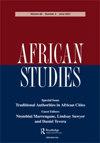Constructing the Symbolic Agendas of Political and Structural Transformation with the Discourse of Black Economic Empowerment in South Africa
IF 1
4区 社会学
Q2 AREA STUDIES
引用次数: 0
Abstract
ABSTRACT By employing a critical discourse analysis and approaching Black economic empowerment as an institutionalised discursive phenomenon, this article argues that BEE has always maintained a discursive stance against the transformation of historical, structural and power inequities in South Africa. However, there is a presumption in academic circles that BEE aims to transform these inequities that emanate from the structural legacies of apartheid and colonialism. This article disputes this presumption in constructionist and discursive terms. It concludes that BEE contains corporate and ahistorical discourses of managerialism and depoliticised empowerment and redistribution that disconnect the policy from structural and political processes. These discourses structurally preserve, conceal, reproduce and depoliticise oppression and domination while running the risk of maintaining existing structures of decision-making, power and procedures in the private sectors. The article finds that primary documents such as the Black Economic Empowerment Commission Report, the Department of Trade and Industry’s BEE Strategy and the BBBEE Acts appropriate anti-colonial and anti-apartheid discourses to legitimise the legalisation, formalisation and implementation of BEE and to promote the inclusion, participation and assimilation of Black people within the existing structures and historical practices that produced racial injustices in the first place.以南非黑人经济赋权话语构建政治和结构转型的象征性议程
摘要本文通过批判性话语分析,将黑人经济赋权视为一种制度化的话语现象,认为BEE一直保持着反对南非历史、结构和权力不平等转变的话语立场。然而,学术界有一种假设,BEE旨在改变种族隔离和殖民主义结构性遗留下来的这些不平等现象。本文从建构主义和话语主义的角度对这一假设提出了质疑。它的结论是,BEE包含了管理主义和非政治化赋权和再分配的企业和非历史话语,这些话语将政策与结构和政治进程脱节。这些话语在结构上保留、隐藏、复制和非政治化压迫和统治,同时冒着维护私营部门现有决策、权力和程序结构的风险。文章发现,黑人经济赋权委员会报告、贸易和工业部的BEE战略和BBBEE法案等主要文件适当的反殖民和反种族隔离言论,使BEE的合法化、正式化和实施合法化,并促进包容性,在最初产生种族不公正的现有结构和历史实践中,黑人的参与和同化。
本文章由计算机程序翻译,如有差异,请以英文原文为准。
求助全文
约1分钟内获得全文
求助全文

 求助内容:
求助内容: 应助结果提醒方式:
应助结果提醒方式:


